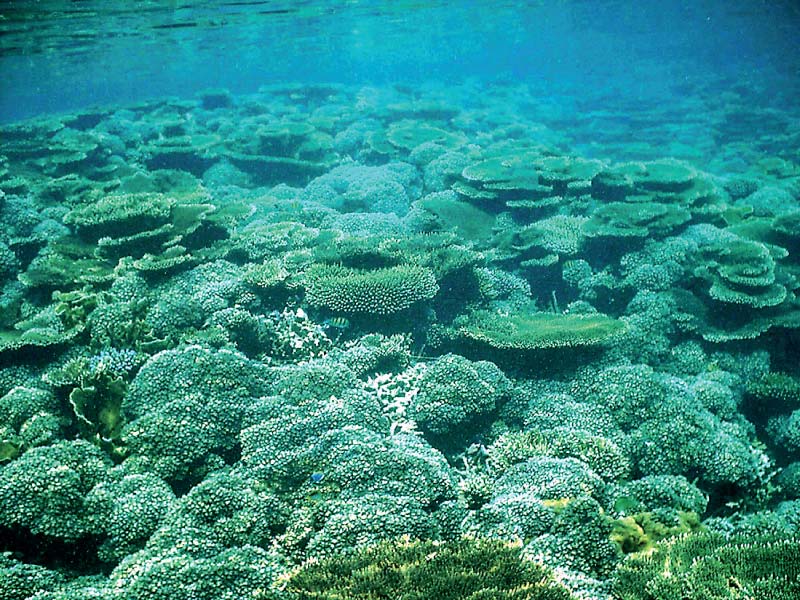Friday Feb 13, 2026
Friday Feb 13, 2026
Thursday, 13 July 2023 00:25 - - {{hitsCtrl.values.hits}}

World Oceans Day 2023 UNDP Sri Lanka
 What is the blue economy and why should we invest in it?
What is the blue economy and why should we invest in it?
Oceans, seas and coastal areas form an integral and essential component of the Earth’s ecosystem. They are vital to sustaining the livelihoods and food security of over three billion people around the world (OECD), and to the economic prosperity of most countries. The ability of these marine environments to provide jobs and nutrition over the long term is, however, already under pressure from human activities. And it is being further threatened by development approaches that are fragmented, uncoordinated, and often in conflict with what science tells us is physically possible or ecologically sound.
Fortunately, many governments, organisations and communities in both developed and developing countries are becoming aware of the need for a more coherent, integrated, fair, and science-based approach to incorporating ocean values and services into economic modelling and decision-making processes.
The Blue Economy paradigm constitutes a sustainable development framework for developing countries to ensure equitable access to the development of and sharing of benefits from marine resources. It also offers opportunities for re-investment in human development and alleviates crippling national debt burdens. Furthermore, it protects and optimises intangible ‘blue’ resources such as traditional ways of life, carbon sequestration and coastal resilience in order to help vulnerable states mitigate the devastating effects of growing inequality, poverty and climate change.
The seabed currently provides 32% of the global supply of hydrocarbons with exploration expanding. Advancing technologies are opening new frontiers of marine resource development from bioprospecting to the mining of seabed mineral resources. The sea also offers vast potential for renewable “blue energy” production from wind, wave, tidal, thermal and biomass sources. The worldwide ocean economy is valued at around $ 1.5 trillion per year, making it the seventh largest economy in the world. It is set to double by 2030 to $ 3 trillion. The total value of global ocean assets (natural capital) has been estimated at $ 24 trillion.
In 2022, Vietnam’s first ocean economy report, titled “Blue Economy Scenarios,” was launched by UNDP and Vietnam Administration of Seas and Islands. It demonstrated that by applying blue economy scenarios, GDP of Viet Nam’s marine economic sectors will be 34% (or $ 23.5 billion) higher compared to the business-as-usual scenario in 2030.
Sri Lanka possesses a territorial sea of 21,500 km2 and an Exclusive Economic Zone (EEZ) of up to 200 nautical miles (370 km) from the coastal line an extent of 517,000 km2. From living resources to exploitable minerals and hydrocarbons, fisheries, access to shipping lanes, offshore renewable energy, oceanic recreational opportunities such as surfing, whale and dolphin watching, deep sea diving, sea entertainment, etc., the opportunities for economic value addition are limitless.
Sri Lanka’s Sea territory is 8 times larger than the land area. So why not optimise its potential for sustainable development?
Charting out a blue economy warrants a clear policy framework that guides the use and allocation of ocean resources. This must be done while ensuring gender, equity and justice, and the capacity to enforce compliance with legislation that outlines how the marine assets should be used and protected. For example, many countries have established the National Ocean Policy or blue economy frameworks that speak to how their marine space should be governed.
The first prerequisite for countries, before investing in blue sectors, is to understand the economic value of their blue assets. Strong scientific research and appropriate ocean observations are crucial to assess and incorporate the real value of the natural blue capital into all aspects of economic activity. The second building block is to ensure collaboration across sectors to create a more operational kind of ocean science to support sustainable economic goals. And a Marine Spatial Planning (MSP) provides a platform for such cross-sectoral collaboration across various stakeholders.
What is a Marine Spatial Plan?
MSP is a proven effective policy process to bring together public and private stakeholders to analyse and allocate ocean space for competing human activities (tourism, renewable energy, fisheries, and conservation) in coastal and marine areas.
With nearly 100 countries/territories having completed or in the process of developing MSP initiatives, it is evident that Sri Lanka makes a strong case for the adoption of a sustainable blue economy concept – with a particular focus on a Marine Spatial Plan. Starting in 2020, China carried out integrated management for natural resources and started to compile National Land Spatial Planning (including ocean and land). In February 2023, India launched the country’s first MSP framework in Puducherry. Seychelles MSP is in final stages, and Vietnam with the support of UNDP is currently in the process of developing a national marine spatial master plan, aiming to fuel sustainable development of marine economic clusters and establish sea-based economic hubs by 2030.
Why should Sri Lanka consider the MSP?
The COP15 Convention on Biological Diversity saw nearly 200 countries, including Sri Lanka, agreeing to protect 30% of lands, oceans, coastal areas and inland waters by 2030. This ‘30 x 30 pledge’ is one of the Framework’s four agreed Goals and 23 Targets to achieve by 2030. The Government of Sri Lanka, aligning itself to its commitment to this pledge, proposed a Marine Spatial plan in the National Budget 2023. This commitment underpins the crucial next steps Sri Lanka must undertake in the roll out of the MSP.
The MSP helps to increase investor confidence by introducing transparency and predictability, in turn boosting investment in innovation and blue technologies, paves the way to attract sustainable investments – including blue, green and sustainable financing, and creates fiscal space while also achieving the related nature conservation targets in line with the country’s commitments with regards to the Sustainable Development Goals. Adopting sustainable blue economy development pathways, including an MSP, can help Sri Lanka turn the present fiscal challenges into opportunities by harnessing the ocean’s unique advantages. Further, MSP allocates space for biodiversity and nature conservation, simultaneously generating economic benefits such as greater certainty of access to desirable areas for new private-sector investments. MSP works across sectors to encourage investments by creating more transparent rules and a predictable investment climate whilst ensuring that human activities at sea do not further jeopardise the health of our ocean.
UNDP’s offer of support on Marine Spatial Planning
Over the last 25 years, UNDP has mobilised over $ 1 billion for ocean protection and restoration in more than 100 countries.
Building on this wealth of experience, UNDP together with the Government of Sri Lanka recently conducted a high-level stakeholder consultation on developing a roadmap towards a Marine Spatial Plan. The said roadmap for Marine Spatial Plan is currently underway and is expected to be launched in the coming months. UNDP and the Lakshman Kadirgamar Institute (LKI) are also putting together a joint policy paper on Blue Economy which will be released in the coming weeks. UNDP will continue to extend support to the Government of Sri Lanka to identify and situate the MSP within the National Development priorities, bring together all relevant stakeholders, whilst strongly welcoming collaborations and new partnerships in the broader blue economy mandate envisioned for Sri Lanka.
Azusa Kubota, Resident Representative, UNDP in Sri Lanka
Azusa Kubota joined UNDP in Sri Lanka as the Resident Representative in January 2023. Prior to her appointment in Sri Lanka, Kubota served as the Resident Representative for UNDP in Bhutan from 2019-2022, where she led overall operations, program implementation, strategic vision setting and representation of the office in the country. She has served UNDP in multiple leadership capacities over the years as the Manager and Head of Office of UNDP in the Solomon Islands and the UN Joint Presence Manager (2016 – 2019); Deputy Resident Representative, Program and Operations for UNDP Lao PDR (2014 – 2016) and UNDP Maldives (2011-2014). She led UNDP’s independent country program and thematic evaluations in multiple countries across regions, while working for UNDP’s independent evaluation office from 2008 to 2011. Her career with UNDP began as the Programme Analyst – Sustainable Economic Empowerment Unit, UNDP Malawi in 2002.
A national of Japan, Kubota holds a Master’s Degree in International Affairs in Economic and Political Development from the School of International and Public Affairs, Columbia University, New York, USA; and a Bachelor’s Degree from Smith College, Northampton, USA. She has spent a semester at Université Cheikh Anta Diop de Dakar, Dakar, Senegal.
Dr. Vagisha Gunasekera, Country Economist, UNDP in Sri Lanka
Dr. Vagisha Gunasekara is a political economist, researcher, and policy analyst, with over 15 years of progressive experience in academia and development research. The geographic scope of her research portfolio extends from Sri Lanka to the United States, Sub-Saharan Africa, South Asia and the Balkans.
She has worked with research teams executing both quantitative and qualitative studies on a range of topics including poverty, labour relations, land settlement and use, service delivery, national- and household debt, and geopolitics. In a consultative capacity, she has conducted analyses on political economy, land and labour policy, geopolitics, and the public debt.
In recent times, Dr. Gunasekera led research on livelihoods in conflict-affected regions in the Secure Livelihoods Research Consortium, UK; designed and taught a course on feminist political economy in the Faculty of Graduate Studies, University of Colombo; and taught development studies as a Senior Lecturer in the Department of Social Studies at the Open University of Sri Lanka.
Dr. Gunasekera holds a PhD from Purdue University, Indiana, USA.